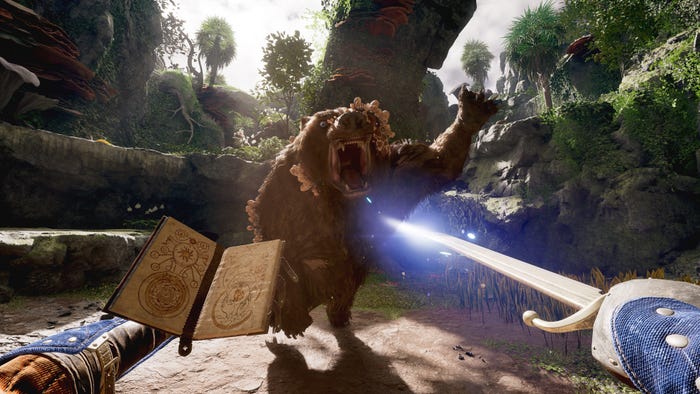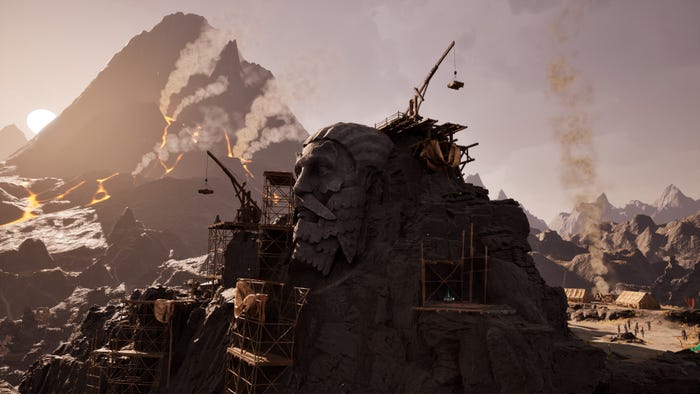Trending
Opinion: How will Project 2025 impact game developers?
The Heritage Foundation's manifesto for the possible next administration could do great harm to many, including large portions of the game development community.

Gamescom 2024 | Read more Gamescom coverage from the Game Developer team right here, including interviews from the show, analysis of leading developer trends, and more.
'Forcing' players to define their role in a big new fantasy universe might be the best kind of worldbuilding you can do.

Stop me if you've heard this one before. You're reviewing a pitch document, and after a few quick pages describing familiar gameplay (hack-and-slash, magic, etc.), you're bombarded with a few thousand words of backstory that's meant to sound like a groundbreaking new IP that will redefine video games. It sounds great. But how do you have any idea if it will catch on?
Well, you don't. It's why so many developers beg newcomers to spend less time worldbuilding and more time scrapping together prototypes. But eventually the day comes around when your team does need to build a brand new fantasy setting. You're probably at a smaller studio, you don't have a big franchise to lean on, and you'll only have so much leeway to build big new mechanical systems. What do you do then?
Obsidian Entertainment's been tackling that challenge for most of its lifetime. Its library is filled with games in original worlds like The Outer Worlds, Tyranny, and the Pillars of Eternity series (we have to give a shoutout to the original wild-as-heck original role-playing game Alpha Protocol while we're here).
Plenty of developers who worked on the games are still at the company, like Avowed game director Carrie Patel. The the first-person action adventure game set in the world of Pillars of Eternity is Patel's latest, after rising through the ranks from game writer on The Outer Worlds to directing the DLC The Peril on Gordon. Now on Avowed, she's helping the team tackle the daunting task of making the Pillars setting a can't-miss for a wider audience.
Is the answer to do some riff on "familiar, but with a twist?" Sort of. Patel said the Avowed team has spent plenty of time picking up where Pillars of Eternity director Josh Sawyer's worldbuilding left off. Sawyer, a history buff, leaned on lesser-explored historical inspirations like the era of the Dutch and East India trading colonies. "Familiar," sure, but probably only if you were paying attention in world history class taught by the high school football coach.
The world of Avowed is equal parts grounded politics and metaphysical encounters with the divine. Patel explained to Game Developer in a chat at Gamescom 2024 that to make these big-brained concepts accessible to all players, the team looked at them through this lens: how can players use these ideas to build their own stories beyond the narrative?
Patel explained that as she's grown into the role of game director, she's expanded how she walks through gameplay when sampling what the team has produced. "You slow down and try to notice each moment of your experience," she said. The questions she asks herself include "when am I excited? When am I curious? When is my attention starting to wane? What's drawing me from moment to moment?" Obsidian's practices of iterating fast and putting content in the build "quickly" make it more possible for her to bring those questions back to her peers and give them time and direction to iterate with.
They're questions players will undoubtedly be asking themselves when they pick up Avowed, since for many it will be their first time entering the complex world of Eora. The game is set in a region called "The Living Lands," where political players and gods are wheeling and dealing to control the world. "I've enjoyed finding the stories that thread both of those worlds together," she said with palpable excitement. What makes it possible for players to pick up her enthusiasm is a clear sense of direction that they need to make their own choices about the world.

Sometimes that choice is "what to do about this bear?" Image via Obsidian Entertainment/Microsoft.
The game's metaphysical elements are defined by the idea that like real-world religions (depending on who you ask), there's no "one right answer" that determines how the divine works. She recalled reading Reddit threads where players debated the ending of Pillars of Eternity and arguing about which god to support as being "clearly the right choice."
The trick, however, is that developers don't want those to be "even" choices, especially "morally" even ones. "It's not saying all things have an equal moral weight to them, but you're not trying to say 'player, this is what you must choose,'" she said. "You're saying 'player, here's a world and here's a conflict and all of its complexities, and there's not always going to be an easy solution.'"
Obsidian's long made games in this way—a way that places a remarkable amount of trust in players. You might look back to Fallout: New Vegas, the company's take on the Fallout series which gives players a far wider array of narrative tools to influence the Wasteland than its predecessor Fallout 3 by Bethesda Softworks.
Patel's experience echoes some advice like we've heard from game directors like Hidekai Miyazaki. His words "trust players" feel present in her words, but she also captured why it still takes an incredible amount of work to build that trust in the first place.

Image via Obsidian Entertainment/Microsoft.
Letting players define their place in the setting "gives players something to chew on," she said, adding that it's "one of the most interesting aspects of roleplay."
"It's not just 'who am I mechanically, what's my vibe.' It's also 'what do I believe in, and how do the situations I'm encountering in this world force me to answer that question?'"
"Force" there is the key word. In an industry that leans on "power fantasies" to excite and attract players, being forced to do anything can be an off-putting pitch.
Maybe if you're one of those worldbuilding-minded developers (look, I feel you, I have a few mega-tomes sitting on my personal hard drive), that's what your game world needs. Not just a history and events that inform it—but the ingredients that push the player around and make them want to define themselves in a grand adventure.
You May Also Like